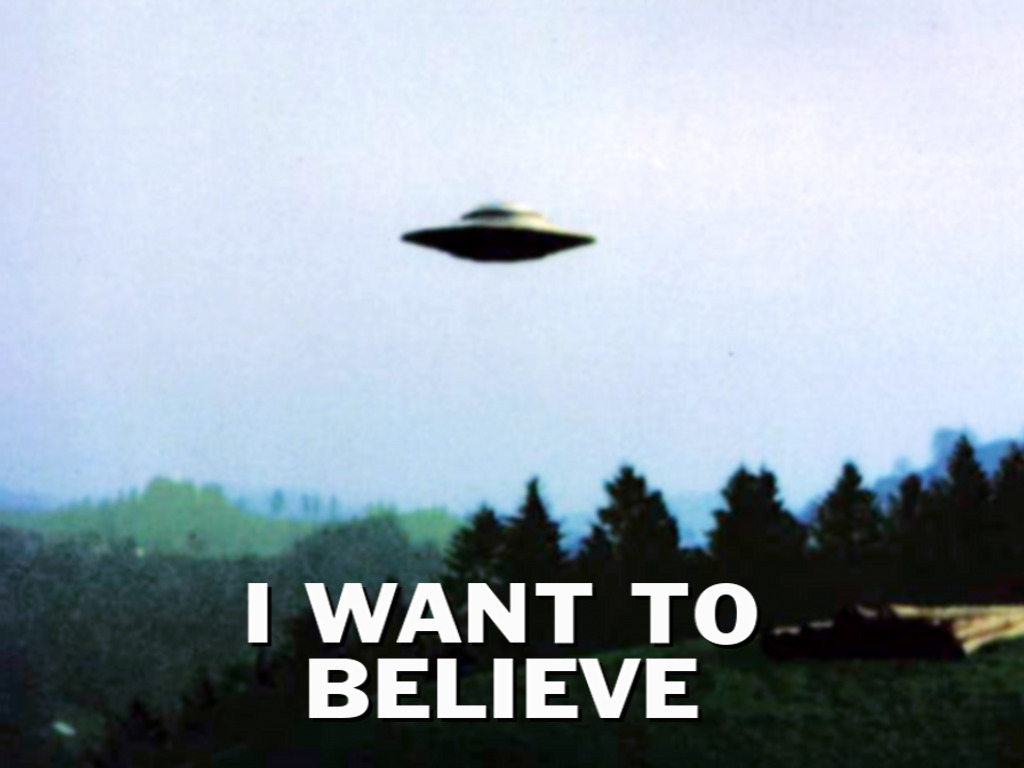"So we just die and we're gone? Forever? Nothing?" she asks, as we pick our way around a vengeful-looking cholla cactus. I could offer up something about living on in good works or the memories of loved ones or whatever, but she is talking about the individual soul, so I don't bother. I just shrug. "Pretty much."
"But why would you choose to believe that?" she asks. She has asked this more than once. Her own afterlife-belief is very comforting and lovely. Clearly, therefore, it is the better one to choose. I mean, you don't choose the ugly dress over the pretty one, right?
I don't know what to tell her. I don't recall ever choosing this particular belief. It's more something that seems unshakably obvious to me. If my unbelief seems baffling to her, I find equally baffling her conviction that belief is something one chooses. Maybe it is that way for some people — belief, like a light switch. On-off.
But I'm not sure we have much agency over our beliefs. We inherit certain beliefs when we're young and easily convinced, and other beliefs we accrue through direct experience — these two kinds of beliefs are the hardest to shake. The beliefs we acquire from books and schooling are not so deeply set, unless our experience pours around them and freezes them into place. I believe some things provisionally (salt makes water boil faster, there's a black hole in the center of our galaxy, cats always land on their feet), but if evidence came along to the contrary, I could change my mind. These are light beliefs, without much riding on them. Other beliefs are heavy, kept firmly in place for many reasons. Fear. Hope. Indoctrination. Inertia.
Something like "the afterlife" is tricky, since there's really no way to know. Perhaps this leaves it open for Pascal's Wager more than other beliefs: if you don't know, you may as well choose the nice story. But I can't shake the evidence at hand: Consciousness appears to be dependent on the brain, and the brain does not survive death. I can't flip the belief switch just because I don't like the direction the evidence is pointing.
As it happens, sometimes really unpleasant things are true: veracity is not dependent on how much we want to believe a thing. When I was 16, I was in a car crash with my best friend. I was in the ICU for four days, and after two days my parents came to tell me my friend was dead. Since she'd hung on for a bit, I'd been pretty sure she was going to make it. The bad news was an incredible shock, and I reacted the way people do when they get horrible news: I literally could not believe it.
Which changed nothing.
It would be nice if beliefs actually changed reality — and they can, when they direct our intentions and actions. But they can't make a true thing untrue. They can't undo death.
So I run headlong into two conclusions that seem inescapable: the first, reality doesn't mold itself around our beliefs. Our beliefs must mold themselves around reality. The second: most of our beliefs happen to us, without us even being aware we've acquired them. That inclines me to be more sympathetic to people whose beliefs are different then mine. It also makes me want to double-down on my own skepticism. There are so many reasons to believe things that are factually wrong: because we want to believe, because it's tradition, because we learned it at school, because it feels good, because everyone else seems to believe it. I don't want to believe wrong things about the world, so I try to go with where the evidence leads me, rather than where my wishes lead me. Sometimes that's a dark road to take.


Interesting post: nicely explicated.
ReplyDeleteSartre once famously said, "existence precedes essence," which I always found to be a comforting thought.
As to the first part of your belief syllogism, "reality doesn't mold itself around our beliefs. Our beliefs must mold themselves around reality." Since we do not have the perceptive filters to properly perceive reality or the cognitive ability to understand reality we are all really at the mercy of irrationality. It is interesting how people choose to build their personal belief castles though.
I personally like to think of myself as a slave to reason, fortunately I am comfortable with illusion.
"I personally like to think of myself as a slave to reason, fortunately I am comfortable with illusion." Well put. :) It's true that we're never going to perceive reality in its totality, being not-omniscient creatures. We see through a glass, darkly. The best we can do is mitigate our propensity toward fooling ourselves. I think it's a worthwhile effort. Stops me from sending all my money to Nigerian princes, at any rate.
DeleteAs a rationalist, I can speculate only on what I've collected through 5 senses designed to sustain me on this planet, a feature of birth --before which, of course, I remember nothing-- same as other animals. Whether or not I will be inconvenienced by nonexistence after life, I don't know. The rationalist believes all possibilities are assembled in the universe, so I trust my senses so far as they are locally useful --probably best phrased by Bachman Turner Overdrive:"You ain't seen nothing yet."
ReplyDeleteYou sound more an empiricist than a rationalist, Geo, though sensible people are usually a bit of both.
DeleteBTO: Now I will have that song as an earworm for the rest of the day! Could be worse. :)
No easy response to a post like this. I don't believe in The Afterlife as much as I believe that this experience is only a fractional, marginal component to the whole enchilada. That's what I've got tonight, Steph.
ReplyDeleteLike Laoch said, this was very well-expressed.
Thank you, Suze.
DeleteI don't think we choose our beliefs as such- I can't recall flicking through a wardrobe of identities and thinking, "This one looks good on me!" and happily wrapping myself in atheism. And yet, it's a relief and a comfort not to have to believe something that says I am always the second option, the lesser choice, as all religions do about women. Like you, I'm still impacted by a loss. My father died when I was 8. What I learned from this was that the world is mutable, and will change around you without consulting you in any way. There's no way back, so you are better to accept alteration, even if you do not like it. The world was not what I'd thought it was, which meant I'd been wrong. Stuff you rely on is more..well DURABLE... if it comes with supporting evidence.
ReplyDelete"The world is mutable, and will change around you without consulting you in any way." Isn't it annoying, how it does that? If I was going to believe a reality into existence, I would definitely invent a world that consulted with me before going off and doing stuff.
DeleteWell done, Steph. As for my thoughts, having been raised Catholic, then becoming a Mormon, then a born-again Christian, before "choosing" to follow a more rational path, I realize now that I am more a product of my environment than I'd like to believe. Had I been born in Calcutta, I would not have been a Catholic, Mormon or born-again Christian. Had I been raised to believe cannibalism was correct, I don't know that I wouldn't still think it true. Yes, we can throw off beliefs of our past, but I'm here to tell you: it's not easy and they never fully leave us. Rational thought, as elusive as it may be, is certainly preferable to me than my prior way of thinking, but it's not as warm and fuzzy, that's for sure.
ReplyDeleteYour comment (especially the warm & fuzzy bit) reminds me of a quote from "Sophie's World," a novel on the history of philosophy.
Delete"A white rabbit is pulled out of a top hat. Because it is an extremely large rabbit, the trick takes many billions of years. All mortals are born at the very tip of the rabbit's fine hairs. where they are in a position to wonder at the impossibility of the trick. But as they grow older they work themselves even deeper into the fur. And there they stay. They become so comfortable they never risk crawling back up the fragile hairs again. Only philosophers embark on this perilous expedition to the outermost reaches of language and existence. Some of the fall off, but other cling on desperately and yell at the people nestling deep in the snug softness, stuffing themselves with delicious food and drink.
"'Ladies and gentlemen,' they yell, 'we are floating in space!' but none of the people down there care.
"'What a bunch of troublemakers!' they say. And they keep on chatting: Would you pass the butter, please? How much have our stocks risen today? What is the price of tomatoes? Have you heard that Princes Di is expecting again?"
It is warm and fuzzy down there in the rabbit's fur, not questioning anything. You really took a big journey, Joe; not too many people go from nestling in the rabbit's fur to wandering the whole length of the rabbit!